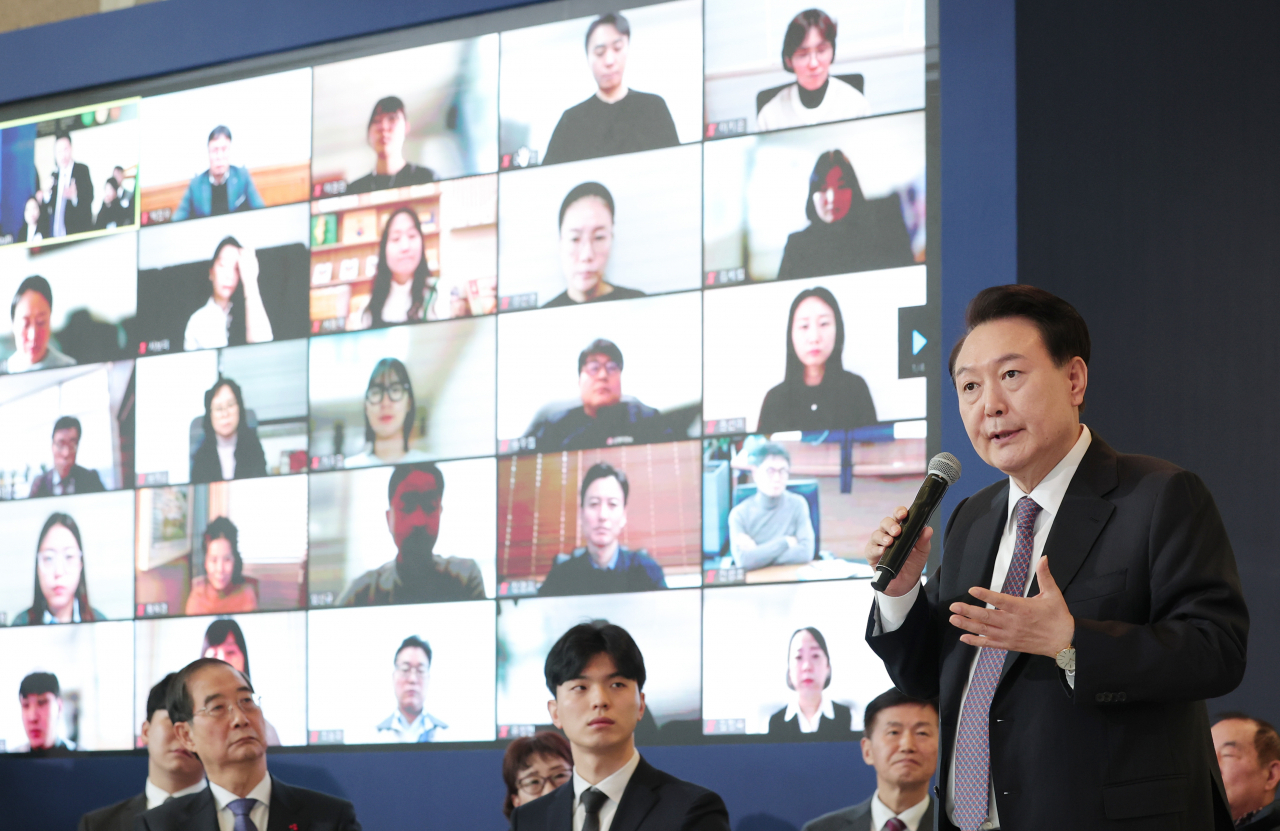Breaking down key points of Korea's 2024 economic policy
Targets adding 100,000 foreign nationals to workforce with eased visa rules
By Park Han-naPublished : Jan. 4, 2024 - 15:37

South Korea has set its economic priorities for the year, aiming to boost domestic consumption by supporting the real estate market and to encourage investment to ensure a steady economic recovery.
In its economic policy directions for 2024 announced Thursday, the government expected that Asia’s fourth-largest economy will see slightly improved growth of 2.2 percent this year, compared with 1.4 percent in 2023, buoyed by an export bounce-back as demand for semiconductors rises. It lowered its estimate for 2024 growth from the 2.4 percent projected in July.
The outlook downgrade reflects the slow recovery of domestic demand, which is expected to be limited this year due to sticky inflation and high borrowing costs.
"In the first half of the year, hardships of people's livelihoods are expected to intensify with sluggish domestic demand and construction investment, and 3 percent-range inflation," Deputy Prime Minister and Minister of Economy and Finance Choi Sang-mok said.
The inflation rate is projected to trend at around 2.6 percent in 2024, starting at 3 percent at the beginning of the year and slowing down to the 2 percent range by mid-year.
A tax deduction program on increases in credit card spending will be introduced as sluggish consumption is expected in the first six months of the year.
Companies will see a 10 percentage point rise in tax credits on the excess of research and development expenditure for the tax period over the base amount. This will mean that small and mid-sized firms will be offered a tax deduction of 60 percent, a change from the current 50 percent.
“The tax credit program has been focused on national strategic technologies or new growth technologies so far. But the new scheme would be applied to all sectors to encourage investment in general,” Yoon In-dae, a director at the Finance Ministry said.
The government decided to extend the temporary tax credit, which expired at the end of 2023, by one year, to offer an additional tax deduction for companies making bigger facility investments than last year.
With housing and construction being at the center of Korea’s domestic economy, measures for boosting the buying of multiplex houses, known as villas in Korea, will also be carried out. Tenants who rent out or reside in a small or low-cost house will be exempt from acquisition tax for a year if they buy the house.
“Transactions of villas have been far too low because of the influence of lease fraud cases. This is a problematic situation for the construction industry, but it is also a problem for people's livelihoods,” First Vice Finance Minister Kim Byung-hwan said.
Authorities will push for tax incentives for the purchase of additional houses in areas with declining populations, in response to worsening rural decline.
Below are key takeaways from the economic policy plans concerning foreign investors and foreign nationals residing in or planning to travel to Korea.
More foreign workers
The government will significantly increase the number of incoming foreign workers by nearly 100,000 to a total of 260,000, up from 172,000 last year, in a bid to alleviate labor shortages in certain industries, as well as in rural and fishing villages.
In order to attract talent in high-tech fields, the number of recipients of government-invited scholarship programs will be expanded for those majoring in science and engineering in the first half of this year. Measures to improve the permanent residency and naturalization systems for talented workers will also be introduced.
The period during which people can stay in Korea in the D-10 “job-seeker visa,” which is allowed for people between jobs or students after graduation, will be extended from a maximum of 2 years to 3 years, and the fields of employment permitted will be expanded from office or professional jobs to employment in industries experiencing severe manpower shortages.
Boosting inbound tourism
The visa fee exemption for Chinese group tours has been extended, and Vietnam, the Philippines, Indonesia, India and Cambodia will also be eligible for group tour visas in 2024.
To enhance convenience for the growing trend of small group tours with fewer than 10 people, measures will be set up to resolve difficulties in securing small-scale transport, such as a simplification of rental car procedures.
Starting from the first quarter, the accommodation types on which foreign tourists can claim VAT refunds will be expanded from hotels with more than 30 rooms to smaller hotels, hostels and condo resorts.
$35b FDI target
Authorities are seeking to attract $35 billion in foreign investment this year. To do so, the budget for the government's cash subsidy program will be quadrupled from 50 billion won ($38 million) to 200 billion won.
The cash support rate for foreign investment in national high-tech strategic industries such as semiconductors, will increase to a maximum of 50 percent of outstanding investments.
The central government will increase its cost-sharing with provincial governments for subsidy support for foreign investment in the Opportunity and Development Zone, which is intended to encourage businesses to locate operations outside of Seoul and Gyeonggi Province.




















